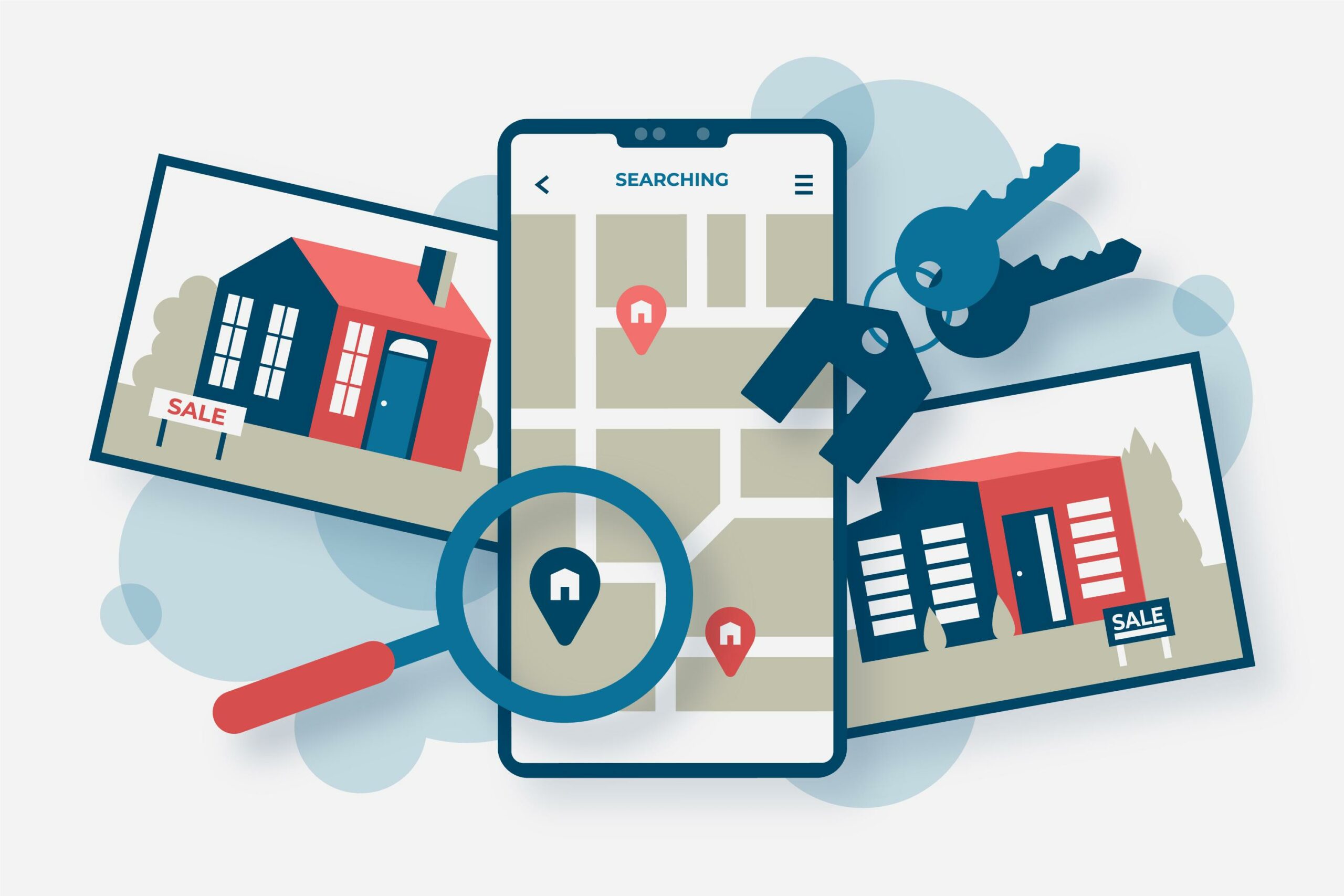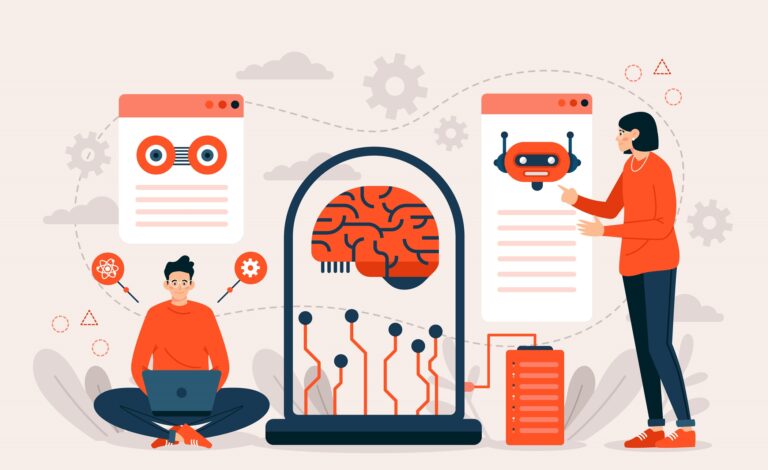AI and Real Estate: How Artificial Intelligence is Changing the Game
In this article, we provide a thorough overview of the revolutionary role of Artificial Intelligence in the real estate sector. Starting with the historical evolution of AI in real estate, we progress to its current applications in areas such as property valuation, market analysis, marketing, and sales, and extend our gaze to potential future trends and emerging technologies. The article also sheds light on the significant changes AI is bringing to professional roles in the industry, alongside addressing the ethical considerations and the need for a careful balance between technological advancements and the irreplaceable human touch. This exploration not only illuminates the efficiencies and opportunities presented by AI but also emphasizes the necessity for the real estate sector to adapt and manage these innovations responsibly for a more efficient and sustainable future.
I. Introduction
A. Overview of AI in Real Estate
In the dynamic world of real estate, the integration of Artificial Intelligence is not just a trend; it’s a revolution. AI in real estate has transcended beyond mere buzzwords to become a core component of both operational strategy and customer engagement. Its applications range from advanced data analytics to enhancing user experiences through virtual reality. The adoption of AI technologies has brought about transformative changes in how properties are marketed, bought, sold, and managed. This evolution is not just altering the landscape of real estate transactions but is also reshaping the roles and strategies of industry professionals.
B. Purpose and Scope of the Article
This article aims to explore the multifaceted influence of AI in the real estate sector. We’ll delve into the evolution of AI in this field, examining how it has progressed from a nascent technology to a pivotal tool in decision-making and operational efficiency. Our journey will take us through various AI technologies currently employed in real estate, their impact on professionals, and the ethical considerations that come with such advanced tools. Furthermore, we will look into the future, predicting how AI might continue to shape this industry. The purpose here is not just to inform but also to provide a nuanced understanding of AI’s role in the real estate sector’s present and future.
II. The Evolution of AI in Real Estate
A. Historical Context
The journey of Artificial Intelligence in real estate is a story of evolution, innovation, and transformation. Initially, the real estate industry, known for its reliance on traditional methods and personal relationships, viewed AI with a mix of curiosity and skepticism. The early days of AI in this sector were marked by simple data analysis tools, which were used to sort through listings and provide basic market insights. These rudimentary systems, however, laid the groundwork for the sophisticated AI applications we see today.
This period was characterized by gradual experimentation and adoption. Real estate professionals began to realize the potential of AI to streamline operations, offer predictive insights, and enhance customer engagement. The shift wasn’t overnight. It required a change in mindset, adapting to new technologies, and learning to trust the insights derived from AI algorithms over traditional intuition-based decision-making.
B. Key Milestones
As AI technologies matured, their impact on the real estate sector became more pronounced. One of the first significant milestones was the introduction of Automated Valuation Models (AVMs). AVMs used advanced algorithms to appraise property values, offering a faster, more cost-effective alternative to traditional appraisals. This was a game-changer, especially for real estate appraisal and lending sectors.
Another major milestone was the integration of AI with Geographic Information Systems (GIS). This allowed for more sophisticated analysis of location data, leading to better insights into market trends and property valuations based on geographical factors.
The advent of virtual reality (VR) and augmented reality (AR) marked another key development. These technologies transformed how properties were showcased to potential buyers, offering virtual tours of properties, and thus broadening the market reach for real estate agents.
Perhaps the most significant milestone has been the utilization of machine learning and big data analytics in predicting market trends. AI systems can now analyze vast amounts of data, including historical market trends, socio-economic indicators, and even consumer behavior patterns, to make accurate predictions about the real estate market. This has not only aided investors and developers in making informed decisions but has also revolutionized marketing strategies in the real estate domain.
These milestones represent just the tip of the iceberg. As AI continues to evolve, it promises to bring even more transformative changes to the real estate industry, making processes more efficient and aligning the industry closer with the digital age.
III. Current AI Technologies in Real Estate
A. Machine Learning and Predictive Analytics
In the realm of real estate, machine learning and predictive analytics are no longer futuristic concepts but current tools driving significant change. These technologies analyze vast datasets to identify patterns and trends, offering invaluable insights into market dynamics and consumer behavior. Predictive analytics, powered by machine learning, can forecast market fluctuations, helping investors and real estate professionals make more informed decisions.
For instance, machine learning algorithms are used to predict property prices with remarkable accuracy, taking into account factors like location, economic indicators, and even the impact of local developments. This technology is also revolutionizing property management, enabling managers to predict maintenance needs and optimize operations. Furthermore, predictive analytics helps in identifying potential investment opportunities and risks, thereby playing a crucial role in strategic planning.
B. Virtual Reality and Augmented Reality
Virtual and augmented reality technologies have taken property visualization to an entirely new level. Virtual reality (VR) offers potential buyers and renters a 3D, immersive experience of a property, without the need for physical visitation. This not only saves time but also allows real estate agents to showcase properties to a global audience.
Augmented reality (AR), on the other hand, overlays digital information onto the physical world. In real estate, this can mean viewing a property with digital enhancements or modifications. For example, AR can help potential buyers visualize renovations and improvements on a property, aiding in decision-making. These technologies are particularly effective in marketing luxury properties and new developments that are yet to be constructed.
C. Chatbots and Virtual Assistants
AI-powered chatbots and virtual assistants are transforming customer service in the real estate industry. Available 24/7, these AI tools can handle inquiries, provide instant responses to common questions, and even assist in scheduling viewings or meetings. They offer a personalized experience to users by learning from interactions and improving over time.
These virtual assistants can handle a high volume of queries simultaneously, ensuring efficient customer service without the need for extensive human resources. They are also instrumental in lead generation and initial client engagement, acting as the first point of contact between the agency and potential clients.
D. Blockchain and Smart Contracts
Blockchain technology and smart contracts are emerging as powerful tools in real estate transactions. Blockchain provides a secure, transparent, and immutable ledger, ideal for recording property transactions. It enhances trust and security in transactions, reducing the risk of fraud and errors.
Smart contracts, self-executing contracts with the terms of the agreement directly written into code, are revolutionizing how real estate contracts are managed and executed. They automate various aspects of the transaction process, from verification of property ownership to the transfer of deeds, making the process faster, more efficient, and less prone to human error.
These AI technologies are not just add-ons but are becoming integral to the real estate industry, shaping a more efficient, transparent, and customer-focused future.
IV. Impact of AI on Real Estate Professionals
A. Enhancing Broker Efficiency
Artificial Intelligence has been a boon for real estate brokers, significantly enhancing their efficiency. AI-driven tools and platforms are streamlining various aspects of a broker’s job, from property listing to closing deals. With access to AI-powered market analysis, brokers can now offer more accurate and data-driven advice to their clients. This not only bolsters their credibility but also saves time typically spent on manual data analysis.
AI is also optimizing property matching processes. By analyzing buyer preferences and behavior, AI algorithms can quickly identify and suggest properties that best match a client’s needs, dramatically reducing the time spent on property searches. Furthermore, administrative tasks like scheduling, client communication, and document management are increasingly being automated using AI, freeing brokers to focus more on client engagement and strategic aspects of their business.
B. Changing Skill Sets for Real Estate Agents
The integration of AI in real estate is reshaping the skill sets required for agents. In this AI-augmented landscape, agents need to be tech-savvy, understanding and leveraging AI tools to stay competitive. Skills in data interpretation and digital marketing are becoming essential, as agents must be able to utilize AI-generated insights for market analysis and property promotion.
Moreover, with AI handling routine tasks, agents are required to hone their interpersonal skills, focusing on building stronger client relationships and offering personalized services that AI cannot replicate. The ability to combine AI insights with a human touch in customer service is becoming a valuable skill in the modern real estate market.
C. New Opportunities and Challenges
AI is opening new opportunities for real estate professionals. For example, AI-driven property management tools are enabling more efficient property maintenance and tenant management, creating opportunities for agents in the property management sector. Similarly, AI in market analysis and forecasting is offering agents a chance to specialize in investment advisory roles.
However, these advancements also bring challenges. One major challenge is the need for continuous learning and adaptation. Real estate professionals must stay abreast of evolving AI technologies to effectively integrate them into their practices. Another challenge lies in balancing AI efficiency with the personalization that clients expect in real estate transactions. Ensuring that the human element remains central in the customer experience is crucial, even as AI technologies become more pervasive in the industry.
V. AI in Property Valuation and Market Analysis
A. Automated Valuation Models (AVMs)
Automated Valuation Models (AVMs) are at the forefront of AI-driven property valuation, offering a more dynamic and sophisticated approach than traditional methods. Utilizing algorithms that analyze vast amounts of data, including historical price trends, current market conditions, and property specifics like location and size, AVMs provide quick and accurate property valuations.
These models have revolutionized the appraisal process, making it faster and more cost-effective. For real estate professionals, AVMs are invaluable tools for making quick decisions, particularly in dynamic markets where property values can fluctuate rapidly. However, while AVMs offer remarkable efficiency, they are not without limitations. They rely heavily on the availability and quality of data, and sometimes may not fully account for unique property features or local market nuances. Consequently, while AVMs are a powerful tool in a real estate professional’s arsenal, they are best used in conjunction with traditional valuation methods and local market expertise.
B. Market Trend Predictions
AI’s capability in market trend prediction is transforming how real estate professionals approach market analysis. By processing and analyzing large datasets, AI can identify emerging trends, predict future market movements, and provide insights into consumer behavior.
These predictive models analyze various factors, including economic indicators, demographic shifts, and even social media trends, to forecast market dynamics. This allows real estate professionals to anticipate changes in property demand and prices, giving them a strategic advantage in the market. For investors and developers, these insights are crucial for making informed decisions about where and when to invest. As these AI technologies continue to evolve, their predictions become increasingly accurate, enabling more precise and strategic planning in real estate.
C. Investment Strategy Formulation
AI’s impact on investment strategy formulation in real estate is profound. With AI, investors and real estate professionals can process and analyze large amounts of data to identify potential investment opportunities and risks. AI-driven analytics can evaluate investment viability, considering factors like projected rental yields, appreciation rates, and market saturation.
Moreover, AI can assist in portfolio management, helping investors to diversify their investments and manage risk effectively. By analyzing market performance data, AI tools can recommend when to buy, hold, or sell assets, optimizing investment returns. This level of data-driven decision-making was previously unattainable and is revolutionizing investment strategy in the real estate sector.
While AI provides powerful tools for investment strategy formulation, it’s important to balance AI insights with human judgment and market knowledge. The most effective strategies often come from a combination of AI-driven data analysis and the nuanced understanding that experienced real estate professionals bring to the table.
VI. AI in Real Estate Marketing and Sales
A. Personalized Marketing Strategies
Artificial Intelligence has revolutionized real estate marketing by enabling highly personalized strategies. AI-powered tools analyze vast amounts of data to understand potential buyers’ preferences, behaviors, and purchasing patterns. This deep understanding allows for the creation of tailored marketing campaigns that resonate with specific audiences.
For instance, AI can segment customers based on their interests, budget, and past interactions, allowing real estate professionals to target them with relevant property listings and content. Email marketing campaigns, social media advertisements, and website content can all be personalized using AI algorithms. This not only increases the effectiveness of marketing efforts but also enhances the customer experience by providing them with options that truly match their needs and aspirations. The result is not just higher engagement rates, but also a more efficient marketing process where resources are allocated towards leads with the highest conversion potential.
B. Lead Generation and Qualification
In the domain of lead generation and qualification, AI is a game-changer. AI tools can sift through large datasets to identify potential leads based on predetermined criteria such as browsing behavior, search history, and interaction with previous marketing campaigns. This level of precision in identifying leads saves substantial time and effort compared to traditional lead generation methods.
Once leads are generated, AI comes into play in qualifying these leads. By analyzing interaction patterns, engagement levels, and responses to previous communications, AI can score leads based on their likelihood to convert. This ensures that real estate agents focus their efforts on the most promising leads. Furthermore, AI can automate initial communication with leads, engaging them until they are ready for direct interaction with an agent, thereby streamlining the lead nurturing process.
C. Sales Process Automation
AI’s contribution to automating the sales process in real estate is significant. From scheduling property viewings to generating and managing legal documents, AI systems are making the sales process more efficient and less prone to human error.
AI chatbots and virtual assistants can handle initial inquiries, provide instant responses, and even assist in scheduling viewings. AI can also assist in the preparation of sales documents, pulling information from various sources and ensuring that all paperwork is complete and accurate. Furthermore, AI tools can track the progress of a sale, sending reminders and updates to both agents and clients, ensuring that all parties are aligned and informed throughout the process.
This automation not only speeds up the sales cycle but also enhances the customer experience by providing quick, accurate, and consistent interactions. The time saved through automation allows real estate agents to focus on building relationships and providing value-added services, ultimately leading to more successful sales outcomes.
VII. Ethical Considerations and Privacy Concerns
A. Data Security and Privacy
In the age of AI-driven real estate, data security and privacy are of paramount importance. The vast amounts of personal and financial data handled by AI systems raise significant privacy concerns. Ensuring the security of this data is crucial, as breaches can lead to serious financial and reputational damage for both clients and real estate firms.
AI systems in real estate collect data from various sources, including public records, online interactions, and personal communications. This data, while invaluable for market analysis and personalized services, also poses a risk if not properly secured. Real estate professionals must ensure that their AI tools comply with data protection regulations such as GDPR in the EU, or similar laws in other jurisdictions.
Moreover, transparency in data collection and usage is vital. Clients should be informed about what data is being collected, how it is being used, and the measures in place to protect it. This not only builds trust but also ensures ethical compliance. Regular audits and updates to security protocols are necessary to keep pace with the evolving nature of cyber threats.
B. Bias and Fairness in AI Algorithms
Bias in AI algorithms is a significant ethical concern in real estate. AI systems learn from data, and if this data is biased, the AI’s decisions, recommendations, and predictions will be biased too. This can lead to unfair treatment of certain groups in property valuations, lending decisions, and even in the marketing of properties.
For instance, if an AI system is trained on historical data that reflects past discriminatory practices in housing, it may perpetuate these biases. This could mean certain neighborhoods are undervalued or certain demographics are consistently not shown high-value properties. Combatting this requires a conscious effort to use diverse and unbiased training data and to continually test AI systems for biased outcomes.
Furthermore, transparency in AI decision-making processes is essential. Understanding how an AI system arrives at a decision can help identify and correct biases. Real estate professionals need to work with AI experts to ensure their systems are as unbiased as possible and remain vigilant about the potential for AI to unintentionally perpetuate historical injustices.
In summary, addressing data security, privacy, and algorithmic bias is not just about legal compliance; it’s about fostering a fair, ethical, and trustworthy real estate industry in the AI age.
VIII. Future Trends and Predictions
A. Emerging Technologies in Real Estate
As we look to the future, the real estate sector is poised for further transformation with the advent of new and emerging technologies. AI, combined with other cutting-edge technologies, is set to redefine the landscape of real estate operations and services.
One such emerging technology is the Internet of Things (IoT). IoT in real estate promises smarter buildings equipped with sensors and devices that can collect data to improve energy efficiency, security, and maintenance. This integration will allow for more sustainable and cost-effective property management.
Another promising area is the use of drones for property inspections and virtual tours. Drones can provide a unique perspective of properties, especially large estates or commercial developments, offering high-quality imagery and videos for marketing purposes.
Furthermore, the adoption of 5G technology is expected to enhance the capabilities of AI and IoT in real estate, offering faster and more reliable data transmission. This will improve the efficiency of smart home technologies and virtual real estate services, providing a seamless experience for clients.
B. Potential Transformations in the Industry
The potential transformations in the real estate industry, driven by AI and related technologies, are extensive. One significant change is likely to be in property search and transactions. AI could lead to more sophisticated online platforms where property searches, virtual viewings, negotiations, and even transactions are conducted seamlessly online, reducing the need for physical visits and paperwork.
AI is also expected to transform the role of real estate professionals. As AI takes over routine tasks, the focus of real estate professionals will shift more towards advisory roles, requiring deeper insights and personalized services. Their expertise will be crucial in interpreting AI-generated data and in maintaining the human element in real estate transactions.
Another area of transformation is in sustainable development and urban planning. AI’s ability to analyze large datasets will be instrumental in designing sustainable and efficient urban spaces, taking into account environmental factors, human behavior patterns, and economic trends.
In summary, the future of real estate, shaped by AI and emerging technologies, promises not only more efficient and personalized experiences but also a shift towards more sustainable and user-centric urban development. This future, while filled with opportunities, also calls for continuous adaptation and learning from industry professionals to harness the full potential of these technological advancements.
IX. Conclusion
A. Summary of Key Points
This exploration into the impact of AI in real estate has highlighted the multifaceted and transformative role of technology in the industry. We commenced by tracing the evolution of AI in real estate, from its early adoption to the current sophisticated applications. Key milestones in this journey included the introduction of Automated Valuation Models (AVMs), the integration of AI with Geographic Information Systems (GIS), and the advent of virtual and augmented reality technologies.
We then delved into the current AI technologies reshaping real estate, covering machine learning and predictive analytics, virtual reality (VR) and augmented reality (AR), chatbots and virtual assistants, and blockchain and smart contracts. Each of these technologies has brought distinct advantages, enhancing efficiency, accuracy, and customer engagement.
The impact of AI on real estate professionals was examined next, highlighting how AI has enhanced broker efficiency, necessitated new skill sets for agents, and opened up new opportunities and challenges. AI’s role in property valuation and market analysis was also discussed, emphasizing its effectiveness in automated valuations, market trend predictions, and investment strategy formulation.
Furthermore, we explored AI’s significant role in marketing and sales within the real estate sector. Personalized marketing strategies, lead generation and qualification, and sales process automation were identified as key areas where AI is making a remarkable difference.
B. Looking Ahead
As we look ahead, the future of real estate in the age of AI seems poised for even more groundbreaking changes. Emerging technologies such as IoT, drones, and 5G will further enhance the capabilities and applications of AI in real estate. The industry is expected to witness a shift towards more online operations, a transformation in the role of real estate professionals towards more advisory capacities, and a focus on sustainable development and urban planning.
These advancements, however, come with the responsibility to address ethical considerations and privacy concerns. The importance of data security, privacy, and the mitigation of bias in AI algorithms cannot be overstated. Ensuring the ethical use of AI will be crucial in maintaining trust and fairness in the real estate industry.
In conclusion, AI in real estate is not just a temporary trend but a fundamental shift in how the industry operates and engages with its clients. Embracing these changes, while navigating the associated challenges, will be key for real estate professionals and companies aiming to thrive in this new era. The journey ahead is filled with opportunities, and those who adapt and innovate will undoubtedly lead the way in shaping the future of real estate.







